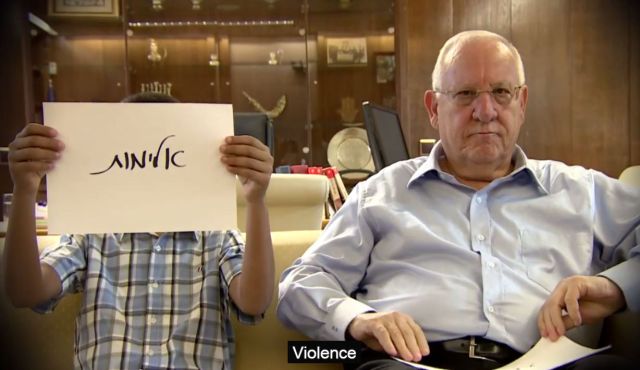Is Israel’s president an anti-Semite?
Oct 14 2014 / 4:16 pm
By Peter Beinart.
Haaretz – Reuven Rivlin is lucky he’s a politician in Israel. Were he a politician in the United States, he’d be labeled an anti-Semite and likely forced from his job.
To imagine what would happen if an American politician uttered those words, think back to early last year. When Obama nominated Chuck Hagel to be his secretary of defense, critics seized on the fact that, years earlier, the then-Nebraska senator had said, “the Jewish lobby intimidates a lot of people up here.” He’d also declared, “I’m a United States Senator. I’m not an Israeli Senator. I support Israel. But my first interest is I take an oath of office to the Constitution of the United States.”
In response, former Bush administration official Elliott Abrams told National Public Radio that Hagel “appears to be … frankly an anti-Semite.” Wall Street Journal columnist Bret Stephens wrote that “prejudice—like cooking, wine-tasting and other consummations—has an olfactory element” and that when it comes to Hagel’s statements about Jews “the odor is especially ripe.” Anti-Defamation League headAbraham Foxman said, “The sentiments he’s expressed about the Jewish lobby border on anti-Semitism.”
Because President Obama refused to back down, and because Hagel tearfully apologized for his comments, the senate still confirmed him. But it was the closest vote for a defense secretary in American history.
All that because Hagel made comments far tamer than Rivlin’s. The Nebraskan merely argued that the “Jewish lobby” (a term many American Jews use) throws its weight around on Capitol Hill (something many American Jews believe). Nonetheless, Foxman suggested that merely by noting the negative influence of Jewish political power, Hagel was playing into anti-Semitic stereotypes about Jewish cabals.
By that standard, Rivlin’s comments are positively bursting with Jew-hatred. First he called Jewish society “sick”—dredging up anti-Semitic tropes about Jews as carriers of cultural and ideological disease. Then he asked whether Jews are “decent human beings”: Questioning their humanity itself. Yet Rivlin isn’t in danger of losing his job. And as of Tuesday, the ADL hadn’t even mentioned his comments on their website.
This double standard is nothing new. Ehud Olmert and Ehud Barakhave both warned that Israel risks becoming an apartheid state. Yet they provoked none of the rage that greeted Jimmy Carter when he offered a similar warning. In 1998, Barak declared that, “If I was [a Palestinian] at the right age, at some stage I would have entered one of the terror organizations” – and was elected Israel’s prime minister the following year. An American senator who said that probably wouldn’t even get the chance to win another election. His party would force him to resign.
This discrepancy stems in large measure from the assumptions America’s “Pro-Israel” organizations and pundits make about intent. No matter how harshly Rivlin, Olmert and Barak condemn Israel, American Jewish leaders can’t imagine calling them anti-Israel or anti-Semitic since Rivlin, Olmert and Barak are prominent Israeli Jews themselves. Chuck Hagel and Jimmy Carter enjoy no such presumption of goodwill. Figures like Thomas Friedman or Jon Stewart, being Jews but not Israelis, fall somewhere in between.
The real test of what gets deemed anti-Israel or anti-Semitic, in other words, often turns less on what is said than on who said it. Which makes a statement’s truth largely irrelevant. By making various, largely unspoken, assumptions about who has earned the right to criticize Israel without being accused of bigotry, American Jewish leaders and hawkish “Pro-Israel” journalists create a tiered debate. Some people can speak unreservedly, even cavalierly, about Israel, secure in the knowledge that their reputations won’t be endangered by charges of bigotry. Others cannot. Which helps explain why so many non-Jewish American politicians and journalists avoid saying anything controversial about Israel. They are well aware that if they say something that arouses Abe Foxman or Elliott Abrams’ ire, they won’t be able to hide beyond their IDF service or their Bar Mitzvah portion.
Maimonides famously declared, “Accept the truth, whatever its source.” To which we might add: Reject the untruth, whatever its source. Luckily for Reuven Rivlin, and unluckily for Chuck Hagel, those principles don’t govern American Jewish discourse about Israel.

